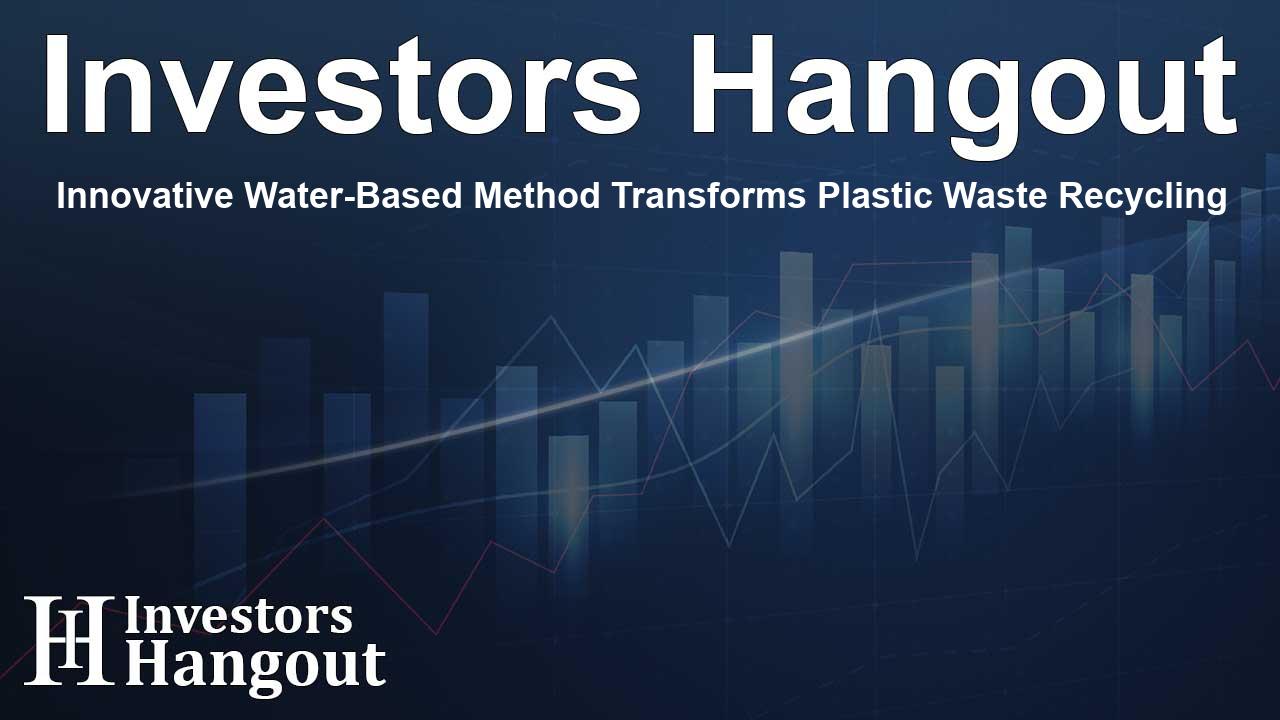Innovative Water-Based Method Transforms Plastic Waste Recycling

Understanding the Plastic Waste Challenge
Plastic has become an integral part of our lives, used in countless applications for its durability and versatility. However, this widespread use comes at a cost, with the world generating more than 400 million tons of plastic waste each year. Alarmingly, less than 10% of this plastic is recycled, leading to severe environmental challenges. With increasing plastic disposal posing a threat to ecosystems, innovative solutions are paramount.
Revolutionary Research at SEOULTECH
Researchers at SEOULTECH have embarked on a groundbreaking study that aims to transform how we manage plastic waste. The team, led by Professor Insoo Ro, has discovered that integrating water into a catalytic process significantly enhances plastic recycling, particularly for polyolefins, which comprise a substantial portion of plastic waste globally. This innovative approach not only opens the door to more effective recycling methods but also contributes to achieving sustainability goals.
Mechanisms Behind the Innovation
The study highlights exciting findings regarding the catalytic process using ruthenium-based catalysts. It reveals that by adding water, the conversion rates of polyolefins to fuels like diesel and gasoline improve dramatically. As explained by Dr. Ro, the water alters the reaction mechanisms positively, boosting catalytic activity and suppressing the formation of unwanted byproducts. This transformation presents an opportunity to create more efficient recycling solutions.
Insights from the Research
Through rigorous experimentation with various catalysts, the researchers noted that those with both metal and acid capabilities performed exceptionally well when water was involved. Under optimal reactions, the efficiency reached a conversion rate of 96.9% for polyolefins, showcasing the potential for large-scale applications.
Exploring Economic Viability
To assess the practical implementation of their findings, the team conducted extensive economic analyses. Their results demonstrate the feasibility of using Ru/zeolite-Y catalysts in commercial settings. The integration of water not only enhances the overall efficiency of the process but also delivers improved environmental outcomes. This represents a pivotal advancement in the field of catalytic recycling.
Implications for Waste Management Practices
This innovative recycling method proposes a substantial shift in conventional waste management. Current practices often leave a significant amount of plastic unrecycled, contributing to environmental degradation. By adopting the water-assisted catalytic approach, the pollution associated with landfills and oceans can be drastically reduced. This direction paints a hopeful picture for future waste management strategies, emphasizing sustainability and efficiency.
The Future of Plastic Recycling
As the research team expresses optimism about future advancements, they envision a practical world where mixed plastic waste can be recycled without the need for pre-sorting. This will not only simplify recycling processes but may also lead to more cost-effective solutions. The vision is clear: transforming plastic waste into valuable resources could pave the way for cleaner environments and reduced pollution.
Join the Movement Towards Sustainability
As this groundbreaking research progresses, the team at SEOULTECH aims to inspire policy changes and investment in advanced recycling technologies. By demonstrating a commitment to sustainable practices, they encourage collaboration across the globe to tackle the rising plastic waste crisis effectively. Keeping our planet clean and promoting sustainability remains at the forefront of this scientific endeavor.
Frequently Asked Questions
What is the main focus of the SEOULTECH researchers' study?
The researchers focus on finding innovative methods to enhance the recycling of plastic waste, particularly through a water-assisted catalytic process.
How does adding water improve plastic recycling?
Adding water alters the catalytic reaction mechanisms, enhancing conversion rates and reducing the formation of unwanted byproducts during the recycling process.
What are polyolefins and why are they significant in this research?
Polyolefins are a major class of plastics that constitute around 55% of global plastic waste, making their recycling crucial for reducing environmental impact.
What potential impact could this research have on waste management practices?
This research could revolutionize waste management by offering a sustainable and efficient method to recycle plastics, thereby reducing pollution from landfills and oceans.
What future developments are anticipated from this research?
Future developments may include the ability to recycle mixed plastic waste without pre-sorting, further simplifying recycling efforts and enhancing economic viability.
About Investors Hangout
Investors Hangout is a leading online stock forum for financial discussion and learning, offering a wide range of free tools and resources. It draws in traders of all levels, who exchange market knowledge, investigate trading tactics, and keep an eye on industry developments in real time. Featuring financial articles, stock message boards, quotes, charts, company profiles, and live news updates. Through cooperative learning and a wealth of informational resources, it helps users from novices creating their first portfolios to experts honing their techniques. Join Investors Hangout today: https://investorshangout.com/
Disclaimer: The content of this article is solely for general informational purposes only; it does not represent legal, financial, or investment advice. Investors Hangout does not offer financial advice; the author is not a licensed financial advisor. Consult a qualified advisor before making any financial or investment decisions based on this article. The author's interpretation of publicly available data presented here; as a result, they should not be taken as advice to purchase, sell, or hold any securities mentioned or any other investments. If any of the material offered here is inaccurate, please contact us for corrections.